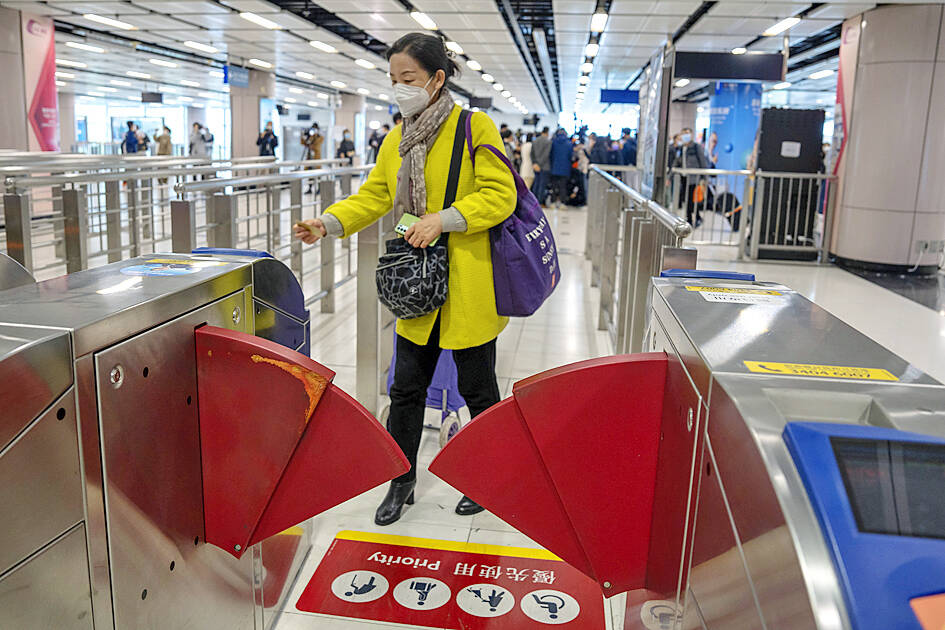After a near-certain contraction last year for the third time since 2019, Hong Kong’s economy is coming back stronger this year and might even grow faster than rival financial hub Singapore for the first time in more than a decade.
Economists are upgrading their forecasts for Hong Kong this year as the city accelerates its reopening with China and the rest of the world.
The median estimate in a Bloomberg survey of 12 economists last week was 3.3 percent growth for this year, higher than the 2.7 percent forecast in a survey of 25 economists in November last year.

Photo: AP
Analysts are becoming more optimistic as Hong Kong sheds its remaining COVID-19 curbs and rolls out a plan to allow people to more freely cross the border to China again.
China on Sunday ended quarantine for arrivals, making cross-border travel a reality again for many people.
An influx of arrivals would be good news for the territory, and could revive businesses that have been hurt by the closure, from hotel and catering companies to investment and wealth management firms.
“We see Hong Kong turning the corner, but the real effects are likely to be seen only in the second half of 2023,” Moody’s Analytics economist Heron Lim (林師順) said.
He expected Hong Kong’s GDP to expand 3.8 percent this year, compared with a November estimate of 3.2 percent.
Lim said quarterly growth could reach 7.7 percent in the October-to-December period.
Hong Kong officials have said they think GDP shrank 3.2 percent last year.
Growth in trade-reliant Singapore is projected to level off this year as the US and Europe head for likely recessions, with the most recent estimate in a Bloomberg survey showing the city-state would expand 2 percent after expanding 3.8 percent last year.
If Hong Kong grows at a faster pace, it would surpass Singapore for the first time since 2008.
Economists who participated in the most recent Hong Kong survey expect the city to turn to fiscal support and other measures to shore up growth this year.
Three respondents said they thought officials would issue more consumption vouchers worth HKD$5,000 (US$640) per person to spur spending, while seven people said either personal or corporate tax cuts could be on the table.
Respondents were allowed to select more than one option.
Even as Hong Kong reopens — to China and the rest of the world — its problems could be hard to fix. The years of isolation cost Hong Kong’s economy an estimated US$27 billion in potential growth, analysis by Natixis SA said.
The city’s property market — the world’s least affordable — is also under strain as interest rates rise and housing demand slides, while global headwinds including weak demand and an impending worldwide recession are adding to the territory’s woes.
“China’s reopening is helpful, but it will not solve all problems Hong Kong has right now,” Natixis senior economist Gary Ng (吳卓殷) said.
He projected growth of 3 percent for this year, slightly below the median estimate.
“As higher interest rates and global slowdown kick in this year, the city’s economic prospect is only cautiously optimistic with short-term pressure,” he said.

NEW IDENTITY: Known for its software, India has expanded into hardware, with its semiconductor industry growing from US$38bn in 2023 to US$45bn to US$50bn India on Saturday inaugurated its first semiconductor assembly and test facility, a milestone in the government’s push to reduce dependence on foreign chipmakers and stake a claim in a sector dominated by China. Indian Prime Minister Narendra Modi opened US firm Micron Technology Inc’s semiconductor assembly, test and packaging unit in his home state of Gujarat, hailing the “dawn of a new era” for India’s technology ambitions. “When young Indians look back in the future, they will see this decade as the turning point in our tech future,” Modi told the event, which was broadcast on his YouTube channel. The plant would convert

‘SEISMIC SHIFT’: The researcher forecast there would be about 1.1 billion mobile shipments this year, down from 1.26 billion the prior year and erasing years of gains The global smartphone market is expected to contract 12.9 percent this year due to the unprecedented memorychip shortage, marking “a crisis like no other,” researcher International Data Corp (IDC) said. The new forecast, a dramatic revision down from earlier estimates, gives the latest accounting of the ongoing memory crunch that is affecting every corner of the electronics industry. The demand for advanced memory to power artificial intelligence (AI) tasks has drained global supply until well into next year and jeopardizes the business model of many smartphone makers. IDC forecast about 1.1 billion mobile shipments this year, down from 1.26 billion the prior

People stand in a Pokemon store in Tokyo on Thursday. One of the world highest-grossing franchises is celebrated its 30th anniversary yesterday.

Zimbabwe’s ban on raw lithium exports is forcing Chinese miners to rethink their strategy, speeding up plans to process the metal locally instead of shipping it to China’s vast rechargeable battery industry. The country is Africa’s largest lithium producer and has one of the world’s largest reserves, according to the US Geological Survey (USGS). Zimbabwe already banned the export of lithium ore in 2022 and last year announced it would halt exports of lithium concentrates from January next year. However, on Wednesday it imposed the ban with immediate effect, leaving unclear what the lithium mining sector would do in the